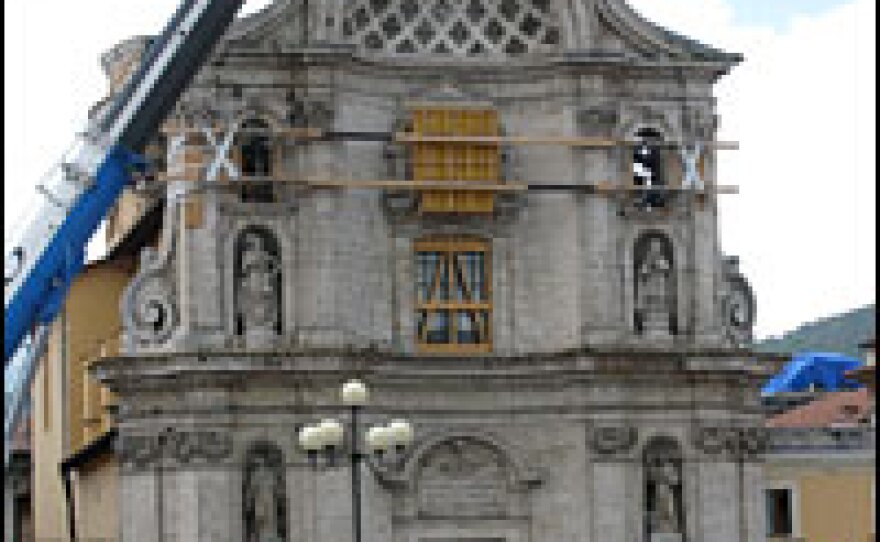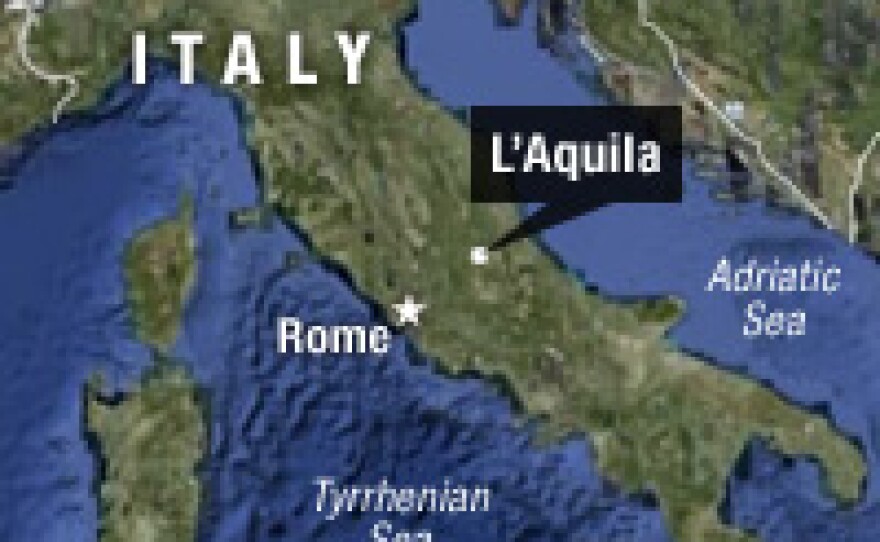

Security is intense around the venue for the G-8 summit being held in Italy's earthquake-devastated city of L'Aquila.
But the biggest fear of organizers of the meeting of the world's leading industrialized countries — which begins Wednesday — is not violent protests by anti-global activists, but continuing aftershocks.
The annual G-8 gathering was to be held on an island off Sardinia. But after the April 6 earthquake, Prime Minister Silvio Berlusconi shifted it to L'Aquila — in solidarity with the victims and also in the hopes foreign leaders will sponsor repair of the city's artistic treasures.
The new venue is a military academy in the suburb Coppito, a sprawling walled compound of reinforced concrete buildings. Police, army and special forces have sealed off the area.
Spare Accommodations, Concerns Over Aftershocks
President Obama and other world leaders will be provided relatively humble quarters in the barracks.
Agostino Miozzo, an official of the civil protection department organizing the G-8 summit, says there will be no fancy accommodations for the visiting dignitaries.
"This is a sober proposal. We still have 25,000 people [living] in tents, 35,000 people in small hotels along the coast," he says, adding that it would be very difficult to offer luxury when so many people are still suffering from the earthquake's devastation.
L'Aquila residents have vented their anger about the slow pace of reconstruction in peaceful demonstrations both in their town and outside the parliament building in Rome.
But protests aren't the major concern of G-8 organizers. The biggest headache is continuing aftershocks. Last week, a 4.1 magnitude tremor reportedly shook the military academy barracks.
Italian authorities say that if another major quake hits L'Aquila, they have a Plan B — rapidly moving the summit to Rome.
Angry Residents, Slow Reconstruction
That would be fine with many of the 65,000 people left homeless who are unhappy with an event they fear is diverting funds from reconstruction.
After three months in a tent camp, many people are demoralized and angry.
Graziella Iapatri and six other members of her family are anxiously waiting for their home to be repaired.
"We just want to go back to our home. This G-8 means nothing to us, absolutely nothing," she says.
L'Aquila's historic center — once the social, cultural and economic heart of the city — is off limits. Authorities have declared nearly all buildings in the area uninhabitable.
Firefighters are in charge. They patrol the area to prevent looting, escort residents to pick up possessions and help in shoring up damaged buildings.
One firefighter, who won't give his name because he is not authorized to talk to the media, says he is worried L'Aquila will become "another dead town, like Pompeii."
A government decree has earmarked $910 million this year for temporary housing and $6.5 billion through 2032 for reconstruction — an amount considered too low given the extent of destruction.
Several citizen groups are taking issue with the way the government has allocated reconstruction funds.
Activist Sara Vegni claims the state intends to build only "new towns" on L'Aquila's outskirts.
"We haven't money for the real reconstruction, reconstruction of our historic center, reconstruction of our houses, reconstruction of our economy. What kind of development model [will the town have] if we haven't work, we haven't a prospect of future?" she asks.
Another concern of many residents is lack of transparency — especially the use of the large sums donated by Italians from around the country.
Past experience is not encouraging.
Six years after an earthquake struck a town in Italy's southeastern Apulia region, only half of the residents have returned to their homes. And 12 years after an earthquake in Italy's central Umbria region, reconstruction is still incomplete.
Copyright 2022 NPR. To see more, visit https://www.npr.org. 9(MDAzMjM2NDYzMDEyMzc1Njk5NjAxNzY3OQ001))






